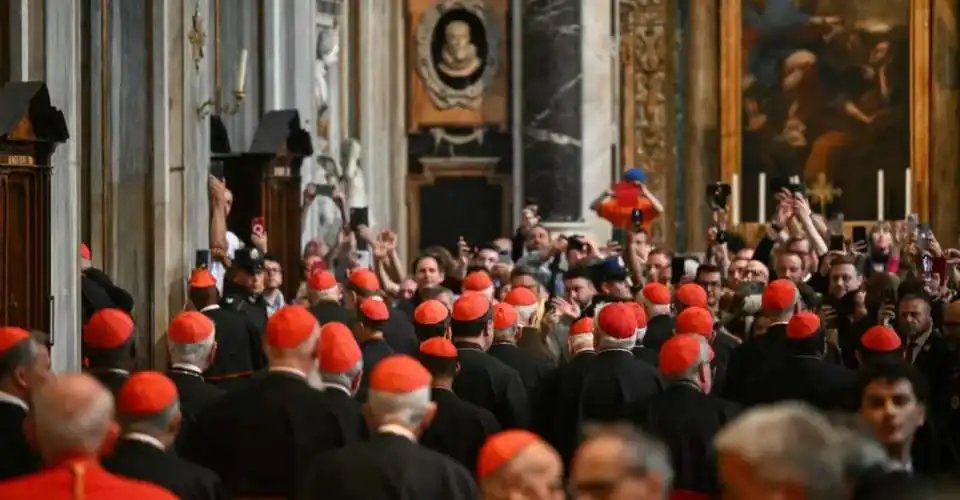
Red-hatted cardinals are expected to set a date Monday for the conclave that will elect a new leader for the world’s 1.4 billion Catholics, following the death of Pope Francis.
Dozens of “Princes of the Church” have been gathering at the Vatican since the Argentine pontiff died on April 21 at age 88. Yet so far, little indication has emerged about who might succeed him.
“If Francis was the pope of surprises, this conclave will be too — it is not predictable at all,” Spanish Cardinal Jose Cobo told El País newspaper on Sunday. In previous conclaves, he said, trends were easier to discern, but this time many cardinals come from outside Europe and have never met before.
Pope Francis was laid to rest on Saturday in a funeral attended by 400,000 people, from royalty and world leaders to ordinary pilgrims, crowding St. Peter’s Square and beyond. The next day, vast crowds visited his marble tomb at the Basilica of Santa Maria Maggiore, after the “pope of the poor” requested burial outside the Vatican walls.
As conflicts and crises rage worldwide, attention is turning to possible successors. Italian Cardinal Pietro Parolin, who served as Francis’s Secretary of State, is seen by many as a leading candidate. British bookmakers William Hill currently place him just ahead of Filipino Cardinal Luis Antonio Tagle, the Metropolitan Archbishop Emeritus of Manila.
Trailing them in the odds are Ghana’s Cardinal Peter Turkson, Jerusalem’s Latin Patriarch Pierbattista Pizzaballa, Guinea’s Cardinal Robert Sarah, and Archbishop Matteo Zuppi of Bologna.
Among pilgrims paying their respects Sunday, 44-year-old Ricardo Cruz, a data and AI specialist from the Philippines, said he hopes for a pope from Asia — but ultimately trusts the cardinals to choose “the right pope.”
While Francis won widespread affection for efforts to build a more compassionate Church, his reforms — particularly regarding doctrine and governance — angered conservative factions, notably in the U.S. and Africa.
Roberto Regoli, a Church historian at the Pontifical Gregorian University in Rome, said the cardinals are seeking someone “who can forge greater unity” at a time of increasing polarization within Catholicism. “I don’t imagine this will be a very quick conclave,” he told AFP.
Following Francis’s death, cardinals have been holding general congregations to organize the funeral and discuss the next steps. Experts suggest the conclave could begin around May 5 or 6, shortly after the nine-day mourning period ends on May 4.
So far, discussions have been marked by “great openness,” according to Italian Cardinal Giuseppe Versaldi. Speaking to La Repubblica, he described the atmosphere as “more spiritual than political or combative.”
Out of 252 cardinals, only 135 are under 80 and thus eligible to vote. Around 80 percent of these electors were appointed by Francis himself, though this does not guarantee they will elect a pope in his image.
Most of the electors are relatively young, and for many, this will be their first conclave. The election, held under strict secrecy in the Sistine Chapel beneath Michelangelo’s famous frescoes, requires a two-thirds majority. Cardinals vote four times a day — twice in the morning and twice in the afternoon — until a new pope is chosen.
Today, fewer than half of the eligible voters are European.
“The future pope must have a universal heart, must love all continents,” said Cardinal Dieudonné Nzapalainga of the Central African Republic, speaking to Il Messaggero. “We must not look at color or origin, but at what is proposed. We need a courageous, bold leader — one who can hold the helm steady even in stormy times, offering stability in an era of great uncertainty.”
